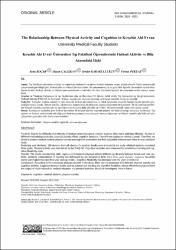The relationship between physical activity and cognition in Kırşehir Ahi Evran University medical faculty students

View/
Access
info:eu-repo/semantics/openAccesshttp://creativecommons.org/licenses/by-nc/3.0/us/Date
2024Metadata
Show full item recordAbstract
Purpose: Due to the difficulty and intensity of medical school education, medical students often lead a sedentary lifestyle. As seen in
different methodological studies, physical activity affects cognitive functions. Few of these studies are related to youth. Therefore, we
aimed to analyze medical students physical activity and cognitive parameters and their association between each other in cross sectional
study.
Materials and Methods: 138 students from all classes of a medical faculty were included in the study. Medical students completed
three scales. Physical activity was determined by the IPAQ-SF. Cognitive variables were measured by autonomous learning and cognitive flexibility scale.
Results: The results revealed that total, vigorous and moderate physical activity differed significantly between female and male students. Similarly independence of learning was influenced by sex assigned at birth. First three years students’ cognitive flexibility
scores were higher than last three year ones (p=0.001). Cognitive flexibility has decreased over the years in medicine.
Conclusion: According to the correlation analysis reported in the study, there was no conclusive link between physical activity and
cognitive abilities. Cognitive function studies such as autonomous learning and cognitive flexibility, whose effectiveness has not been
the subject of much research in medical education and physical activities should be investigated more in future Amaç: Tıp Fakültesi eğitiminin zorluğu ve yoğunluğu nedeniyle tıp öğrencilerinde sedanter yaşam görülmektedir. Farklı metodolojik
çalışmalarda görüldüğü gibi, fiziksel aktivite bilişsel işlevleri etkiler. Bu çalışmaların çok azı gençlikle ilgilidir. Bu nedenle tıp fakültesi
öğrencilerinin fiziksel aktivite ve bilişsel parametrelerini ve birbirleri ile olan ilişkilerini kesitsel bir çalışmada analiz etmeyi amaçlandı.
Araçlar ve Yöntem: Çalışmaya bir tıp fakültesinin tüm sınıflarından 138 öğrenci dahil edildi. Tıp öğrencileri üç ölçeği tamamladı.
Fiziksel aktivite IPAQ-SF ile belirlendi. Bilişsel değişkenler otonom öğrenme ve bilişsel esneklik ölçeği ile ölçüldü.
Bulgular: Sonuçlar, toplam, şiddetli ve orta düzeyde fiziksel aktivitenin kız ve erkek öğrenciler arasında önemli ölçüde farklılık gösterdiğini ortaya koydu. Benzer şekilde, öğrenmenin bağımsızlığı da doğumda atanan cinsiyetten etkilenmiştir. İlk üç sınıf öğrencilerinin bilişsel esneklik puanları son üç sınıf öğrencilerine göre daha yüksekti (p=0.001). Bilişsel esneklik tıpta yıllar içinde azaldı.
Sonuç: Korelasyon analizine göre fiziksel aktiviteler ile bilişsel işlevler arasında anlamlı bir ilişki olmadığı sonucuna varılmıştır. Tıp
eğitimi ve fiziksel aktivitelerde etkinliği çok fazla araştırmaya konu olmayan otonom öğrenme ve bilişsel esneklik gibi bilişsel işlev
çalışmaları gelecekte daha fazla araştırılmalıdır.
Source
Ahi Evran Medical JournalVolume
8Issue
1Collections
The following license files are associated with this item:


















